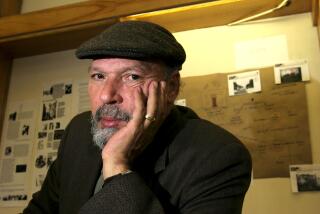Robert Anton Wilson, 74; Illuminatus trilogy writer
- Share via
Robert Anton Wilson, a futurist, philosopher and coauthor of the Illuminatus trilogy, a cult science fiction series about a secret global society, died Jan. 11 at his home in Capitola, Calif. He was 74.
Wilson had post-polio syndrome, which had severely weakened his legs and led to a fall that left him bedridden for the last seven months, his daughter Christina Pearson said.
The author of 35 books, Wilson wrote about extrasensory perception, mental telepathy, metaphysics, paranormal experiences, conspiracy theory, sex, drugs and what he called quantum psychology. He explored outrageous ideas in a serious way and once described his writing as “intellectual comedy.”
“If my books ... do what I intend, they should leave the reader feeling that the universe is capable of doing something totally shocking and unexpected in the next five minutes,” he once told Contemporary Authors, an Internet database.
“I am trying to show that life without certainty can be exhilarating, liberating, a great adventure.”
He wrote the Illuminatus trilogy with Robert Shea in the late 1960s, when they were editors of the Forum department of Playboy magazine.
The books “The Eye in the Pyramid,” “The Golden Apple” and “Leviathan” were published in 1975.
They never hit the bestseller lists but have never gone out of print. Shea died in 1994.
“In part because it dealt with conspiracies in a science fiction way, the trilogy achieved a cult following among science fiction readers, hippies, the psychedelic crowd,” Mark Frauenfelder, a co-editor of the pop culture website boingboing.net, told the New York Times last week. Wilson often wrote for the print magazine that spawned the website.
The trilogy is a dense tangle of conspiracy theories that was inspired by a thick file of letters the authors received from conspiracy buffs. It begins with the investigation by two New York City detectives into the bombing at the office of a leftist magazine and the disappearance of its editor.
In the trilogy, a writer for the magazine falls into the hands of the Discordians, a secret society locked in battle with the all-powerful Illuminati, a group of elite authoritarians who control the world.
The stories have been credited with inspiring many pop culture references to Illuminati, from “The X Files” to “The Da Vinci Code.”
After completing the trilogy, Wilson began writing nonfiction books, including “Cosmic Trigger” (Pocket Books, 1977), a bizarre autobiography in which, among many other tales, he describes episodes when he believed he had communicated with extraterrestrials while admitting that he was experimenting with peyote and mescaline.
A theme in much of Wilson’s writing was that people should never rule out any implausibility, from the existence of UFOs to the idea that lasagna can fly.
“I never try to persuade the reader to think what I think; I always try to offer a heaping platter of sweet-and-sour reality tunnels and provoke and prod the reader to think and choose for him/herself,” he told Booklist, the American Library Assn.’s magazine, in 1999.
On Jan. 6, in his last post on his personal blog, he wrote: “I don’t see how to take death seriously. I look forward without dogmatic optimism, but without dread. I love you all and I deeply implore you to keep the lasagna flying.”
Born in Brooklyn, N.Y., in 1932, Wilson contracted polio when he was 4. He attended Catholic schools, an experience he later described as disillusioning. His skepticism about religion deepened at Brooklyn Polytechnical College, where he discovered the work of semantics theorist Alfred Korzbyski and began to doubt the certainty of most things.
Wilson later called his philosophy “Maybe Logic,” which was also the title of a documentary about him released last year.
He briefly studied at New York University and worked as an engineering aide, a salesman and a copywriter and was an associate editor at Playboy from 1965 to 1971.
He experimented freely with drugs and was friendly with Timothy Leary, a Harvard psychologist and advocate of LSD.
In later years, when he began to suffer from post-polio syndrome, Wilson became a champion of medical uses of marijuana.
Besides Pearson of Santa Cruz, Wilson is survived by another daughter, Alexandra Gardner of Eugene, Ore., and a son, Graham of Watsonville, Calif. His wife of 39 years, Arlen Riley Wilson, died in 1999.
More to Read
Sign up for our Book Club newsletter
Get the latest news, events and more from the Los Angeles Times Book Club, and help us get L.A. reading and talking.
You may occasionally receive promotional content from the Los Angeles Times.








